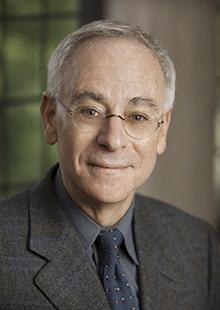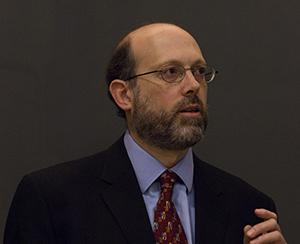Free Speech and Academic Freedom
Academic Freedom Is Not a First Amendment Right for University Employees, Cautioned Yale Law School Dean Robert Post, in a Speech at Columbia Law School
New York, March 7, 2016—American professors mistakenly confuse academic freedom with their individual right to free speech, said Robert C. Post, dean and professor at Yale Law School, in a Feb. 25 talk at Columbia Law School that provoked as many questions and responses from faculty as from students.
Post embodied the “rare combination” of a widely published scholar on the subject of academic freedom and a practiced hand in school administration, observed constitutional law scholar Philip Hamburger, the Maurice and Hilda Friedman Professor of Law and the director of the Center for Law and Liberty, the event sponsor.
The lecture began with Post pointing out the number of professors in the room. “I have to tell you, I am completely blown away by this audience, and it tells me I could be walking into some sandstorm of controversy,” he said to laughter. He then cited his own experience as a drafter of the academic-freedom policy for the University of California system and as the general counsel for the American Association of University Professors.
Robert C. Post, dean and professor at Yale Law School |
“I’ve talked to a lot of professors,” he said, “and if you ask the average professor ‘what is the meaning of academic freedom,’ they will say something like, ‘It means freedom of speech,’ and they have in mind the First Amendment. My thesis today is that’s absolutely the wrong way to think about it.
“To understand why the picture that equates freedom of speech and academic freedom is misleading, to say the least, you need to go back and think about where academic freedom comes from and what it’s designed to do,” Post said.
Roots of the University’s Mission
Post’s story started in the first half of the 19th century, when American universities were typically religious institutions that instructed young men in accepted and moral truths, “the cultural capital necessary to lead,” he explained. “It was a quiet time in higher education, and then the Civil War completely changed that.”
American academics began to make pilgrimages to the great universities in Germany, which “had taken on the job of producing new knowledge,” said Post. “They were devoted to increasing something called wissenschaft, meaning a kind of systemized knowledge, and a class of professional academics was inventing fields like chemistry. Americans like, say, William James would go to Germany, they would see this real institution, a university that was actually devoted to creating new knowledge, and they would come back to this country and look at these very parochial institutions of higher learning. They’d say, we have to reorient the meaning and mission of American higher education.”
Post said the first American university pledged to the German model of “advancing knowledge” was Johns Hopkins, founded in 1876; others followed. “The invention of academic freedom in the United States—there was no academic freedom before the 20th century—comes directly from this shift in the mission of the university,” he said.
The idea of academic freedom had been broached in Germany, but an important difference distinguished German and American schools. “The universities in Germany were state institutions, and professors were bureaucrats.” Post explained. “The state said, ‘We will leave you alone to do your bureaucratic duty, which is to discover new knowledge, but the price of that is you stay out of politics.’”
Professors in the Public Service
“This was not an option for American professors, because the American professoriate developed during the Progressive Era, when the idea of the American expert was always an expert in the service of public ends,” said Post. “Some American professors carried over this German idea of academic freedom—Harlan Stone [LL.B. 1898, U.S. Attorney General, Supreme Court Justice, dean of Columbia Law School] had something like that idea in the second decade of the 20th century. But mostly American professors rejected that notion, and they wanted a different concept of academic freedom. The need for academic freedom arose when the idea of the university producing knowledge collided in the United States with the political economy of higher education.”
At Stanford, in 1900, economics professor Edward Ross was fired at the request of Jane Stanford, the university’s owner and widow of the school’s railroad-magnate founder. She didn’t like Ross’s pronouncements on the gold standard, labor, and Asian immigration. “In Germany professors had the protection of the bureaucratic system that extended to officers of state, but in the United States professors were employees who could be fired at the discretion of those who owned universities,” Post said. “American universities were owned—by the states, by churches, or by private proprietors.”
Ross’s firing shocked academia. “American professors began to ask, ‘How can we do our job if we're subject to control by those who own the universities? They’re lay people—they know nothing about economics, they know nothing about immigration, or about whether we should have a gold standard or a silver standard. If they control us, we can't develop these forms of knowledge as a matter of expertise,’” said Post.
A Corporate Vision of Freedom
In 1915, educators John Dewey and Arthur Lovejoy (who had quit Stanford following Ross’ dismissal) organized a meeting to form an organization to ensure academic freedom for faculty members. That meeting resulted in the American Association of University Professors, with Dewey as president, and its Declaration of Principles on Academic Freedom and Academic Tenure, which stated, “Once appointed, the scholar has professional functions to perform in which the appointing authorities have neither competency nor moral right to intervene. The responsibility of the university teacher is primarily to the public itself, and to the judgment of his own profession."
That declaration and its follow-up, 1940’s Statement of Principles on Academic Freedom and Tenure, sought to protect scholars’ freedom of research, freedom in the classroom, and freedom of “extramural utterances” and actions. Post noted the documents’ goals have since been “endorsed by 180 educational organizations” and “incorporated as a matter of contract into the policy law that govern most present institutions of higher education in the United States.” While controversies over teaching and utterance are “very different” from research, Post said, the guarantee to freedom of research is clear—and it has nothing to do with one’s constitutional right to free speech.
But It’s Not Free Speech
Under the First Amendment, said Post, “you can say there’s no content discrimination—you can't penalize somebody because of the content of their speech,” said Post. But all ideas are not equal. “Academic freedom rests on the notion that, as best we can determine, there are true ideas and false ideas.”
The 1915 Declaration defined academic freedom of research as the freedom to pursue the scholar's profession according to the standards of the profession. Professors are free to set forth their conclusions without fear of dismissal, the Declaration said, but only if their conclusions have been reached “by a scholar's method and held in a scholar's spirit.” The Declaration concludes by saying academic freedom upholds “not the absolute freedom of utterance of the individual scholar, but the absolute freedom of thought, of inquiry, of discussion and of teaching, of the academic profession.”
“We are so used to thinking of rights as individual rights,” Post said. “The freedom of speech is an individual right. It's my right; it's your right. Here, we have the notion that [academic freedom] is not the right of a person individually—it is the right of a profession to determine for itself what is true, what is not. We don't have that concept easily at hand, the idea of a right that is held by a profession rather than by a person. If I reduce it to its essence, the argument that the 1915 Declaration puts on the table is that a university is not a business venture—it’s not designed to serve the goals of its owner. Rather, the institution of the university is a public institution that serves a public trust, and that trust is in the creation and dissemination of knowledge.
“Here's the basic difference between academic freedom and the First Amendment: First Amendment rights are individual, but academic freedom applies to a discipline, meaning a community of inquiry. Knowledge is produced by a community of inquiry, and therefore the right of the discipline is not to be judged by those outside the discipline. The most basic point about academic freedom is that I, as a professor, can only be judged by my peers.”
‘The Dangers of Discrimination’
A series of concluding questions concerned the fates of scholars whose views were unpopular or controversial among their peers. Hamburger sought to sum up the various points when bringing the event to a close.
Columbia Law School' Professor Philip Hamburger, director of the Center for Law and Liberty |
“A very interesting conversation has evolved here,” Hamburger said. “Robert has put forth a corporate vision of academic freedom, which developed at the beginning of the 20th century in response to a series of problems threatening the freedom of academics. But since then, there's evolved a whole new series of issues involving exclusion, and the question is whether a vision of academic freedom that evolved in response to one set of problems is also sufficient to deal with a host of other problems that several of us have asked about.
“I don't know the answer to that, but I think we should recognize what's going on here. There are fundamental questions about what the nature of this freedom is, and that's why freedom of speech is brought in to address the balance, because some of us here feel that corporatism doesn't address the dangers of discrimination carried out by the corporate entity. There is a risk that the corporate account of academic freedom is a little too cozy.”

